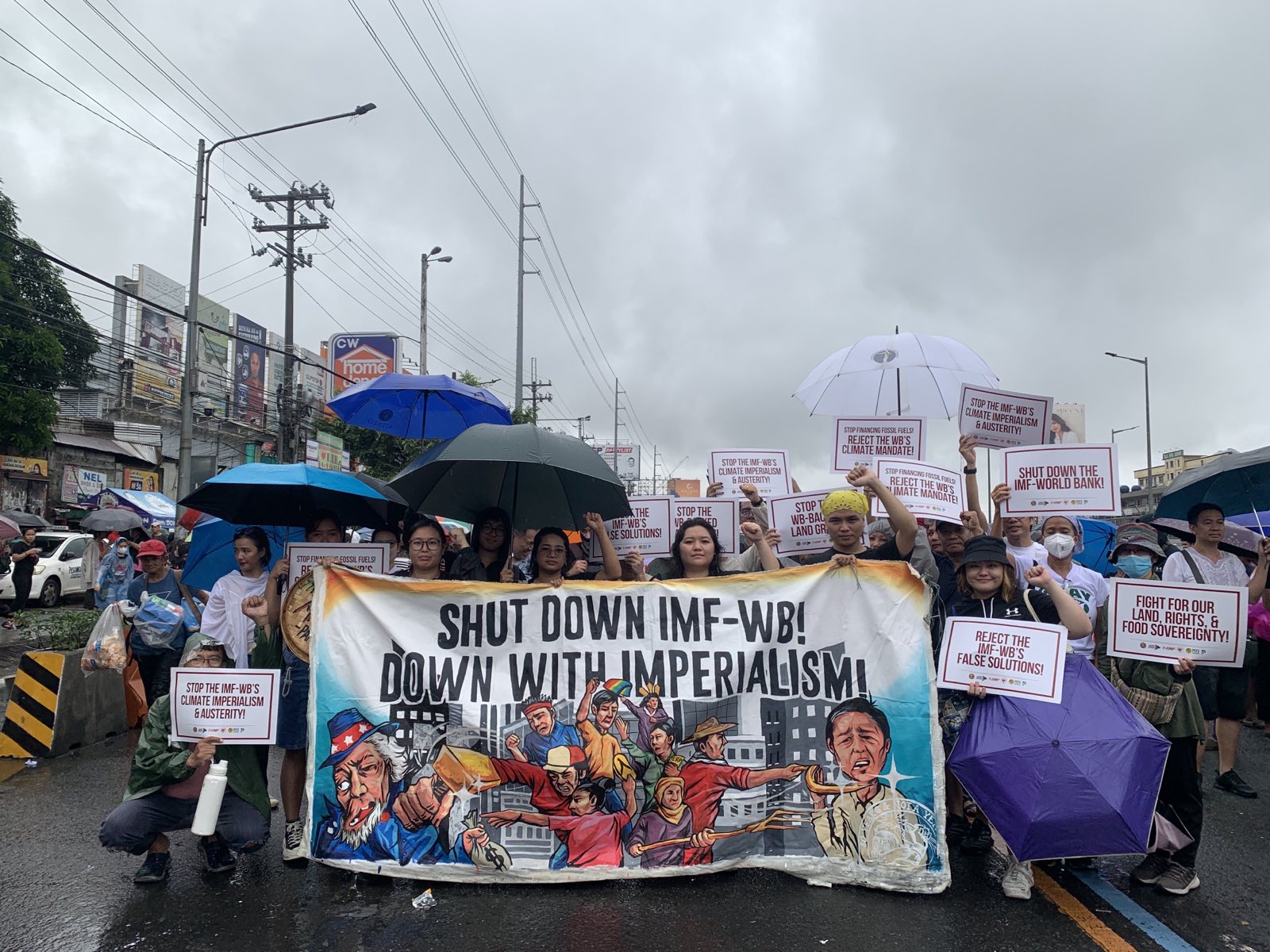This statement is issued in time for the July 22 Global Day of Action against the 80 years of the IMF-WB, called by the Reclaim Our Future network. July 22 marks the last day of the 1944 Bretton Woods Conference that established the International Monetary Fund and the World Bank.
Rural peoples’ movements and communities demand the shutdown of the International Monetary Fund (IMF) and World Bank. Over the past 80 years, imperialist governments and their transnational corporations (TNCs) have used the IMF-World Bank, in collusion with their client states and local elites, to undermine rural peoples’ rights to food, land, and resources, worsening hunger, climate, and environmental crises for corporate profit.
Through neoliberal conditionalities tied to structural adjustment programs and loans, the IMF-World Bank imposed the liberalization, deregulation, and privatization of food and agriculture in many poor countries. About 43% of IMF loan programs in 100 countries from 1980 to 2014, for instance, targeted food and agriculture – of which more than 59% of conditionalities involved the abolition or reduction of state support and promotion of unregulated market forces. Before the wave of neoliberal reforms in the 1980s, World Bank loans promoted the Green Revolution in Asia, Africa, and Latin America, requiring the massive use of expensive and toxic agrochemical inputs and proprietary seeds supplied by TNCs that pushed poor farmers into debt and bankruptcy, poisoned farmlands and biodiversity, and aggravated global warming.
The extensive neoliberal restructuring bankrolled by IMF-World Bank loans deepened the export-oriented and import-dependent character of food and agricultural production in many backward economies that severely destroyed their food security, rural livelihoods, and overall development. Combined with other structural reforms facilitated through free trade agreements such as the Agreement on Agriculture (AOA) under the World Trade Organization (WTO) and other imperialist tools, IMF-World Bank’s debt-funded reforms pushed the poorest countries from food trade surpluses in the 1960s and 1970s to annual food trade deficits that are doubling in size decade by decade.
Moreover, these imperialist financial institutions have played pivotal roles in the corporate grabbing of agricultural land and resources in poor countries while subverting genuine land reform. Through technical assistance and financial loans, the World Bank, for instance, promoted neoliberal market-assisted land reform (MALR) and distorted land redistribution as a simple market transaction between landlords and landless farmers facilitated by the state. Without the power of the state to carry out compulsory land redistribution based on social justice principles, MALR allowed landlords, compradors, and their imperialist patrons to retain and expand monopoly control over vast tracts of agricultural lands. Chronic and widespread peasant landlessness continues to fuel rural unrest in countries that embraced MALR, such as Brazil, Colombia, the Philippines, and others.
Recently, the World Bank organized its Land Conference 2024 with the theme Securing Land Tenure and Access for Climate Action. The objective is to promote climate change adaptation and mitigation investments and guide land governance amid competition for land and resources. While secure land tenure is essential for small farmers, framing it in terms of investment promotion in the context of the World Bank’s MALR and overall neoliberal policy environment often leads to dispossession. In this case, land tenure merely legitimizes the easy transfer of land rights through sale from small landholders to big landholders and corporations. Such a program is alarming, especially when linked to the growing trend of highly pollutive industries rushing to buy lands for their carbon-offsetting goals, which are false climate solutions and come at the expense of farmers and food production.
Such initiatives are on top of direct investments from the World Bank’s private sector arm, the International Finance Corporation (IFC), that result in massive land grabs and displacement like its 11 projects in Africa covering 700,000 hectares. These investments include projects contributing to climate and environmental crises and human rights violations, such as large-scale mining and monoculture plantations. Indeed, the World Bank’s hosting of the loss and damage fund is the height of insult to the billions of victims of climate injustice, displacement, and rights abuses, many from rural communities.
Decades of the World Bank’s espousal of MALR and the IMF’s broader push for financial sector deregulation created the conditions for financialization to thrive in food and agriculture, driving speculative food price spikes resulting in greater food insecurity and hunger, especially among the rural poor and encouraging more land grabbing. Over 230 investment funds are operating in the food and agriculture sector, collectively managing around US$ 44 billion in assets, including private equity funds managing farmlands, as investors turn to farmlands not primarily to produce food and other agricultural products but as assets to hedge their other investments or squeeze profits from the land’s value and rent. These investments mean ownership or control over lands has been taken away from farmers in favor of the parasitic financial firms.
All these contribute to the chronic and ever-worsening crisis facing the world’s rural peoples today. Farmlands have remained heavily monopolized, with just 1% of farms controlling 70% of farmlands worldwide. In the past two decades, ownership or control over more than 65 million hectares of land has been taken away from farmers through land deals involving foreign or transnational investors. Land and resource grabs, combined with high food prices due to financial speculation and other factors, are exacerbating global hunger, with 2.4 billion people globally experiencing food insecurity.
Rural peoples’ resistance against the IMF-World Bank and their policies and programs has persisted throughout the 80 years of existence of these imperialist financial institutions. The rural peoples’ movements and their allies, which comprise the Global Peoples’ Caravan for Food, Land, and Climate Justice, will continue these struggles. A future without hunger, dispossession, and destruction necessitates the shutdown of the IMF-World Bank to advance food sovereignty, people-led agroecology, genuine land reform, and climate justice. ###

